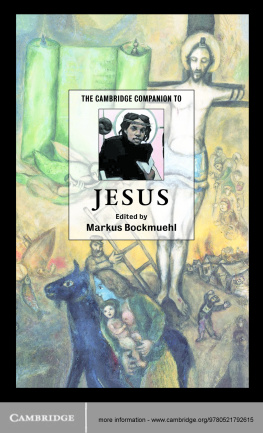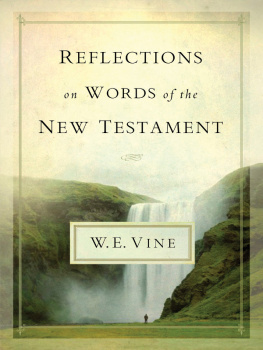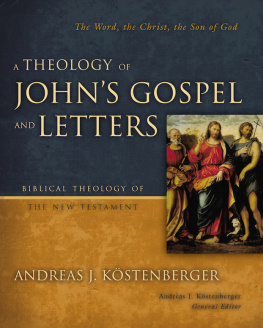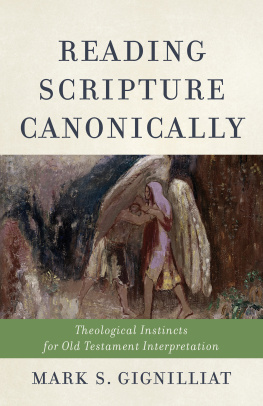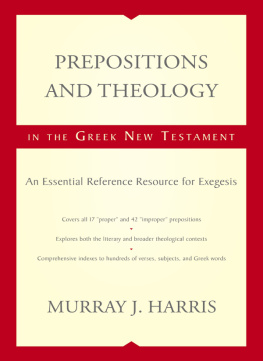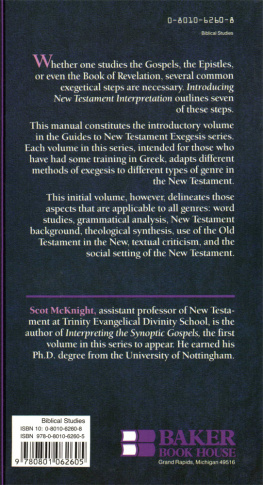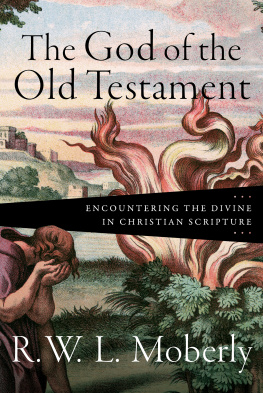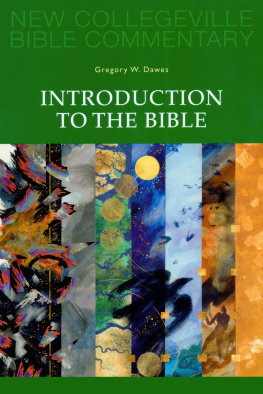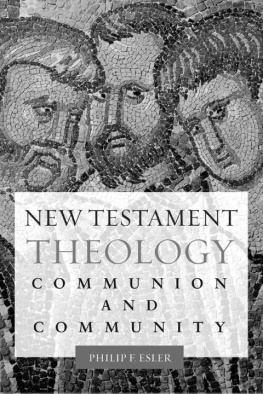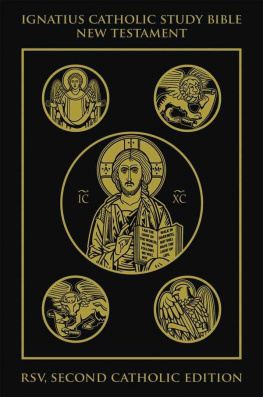
STUDIES in THEOLOGICAL INTERPRETATION
Series Editors
Craig G. Bartholomew
Redeemer University College
Joel B. Green
Asbury Theological Seminary
Christopher R. Seitz
University of St. Andrews
Editorial Advisory Board
Gary Anderson
University of Notre Dame
Markus Bockmuehl
University of St. Andrews
Richard Hays
Duke University Divinity School
Christine Pohl
Asbury Theological Seminary
Eleonore Stump
Saint Louis University
Anthony Thiselton
University of Nottingham
University of Chester
Marianne Meye Thompson
Fuller Theological Seminary
Kevin Vanhoozer
Trinity Evangelical Divinity School
John Webster
University of Aberdeen
Jim Kinney
Baker Academic
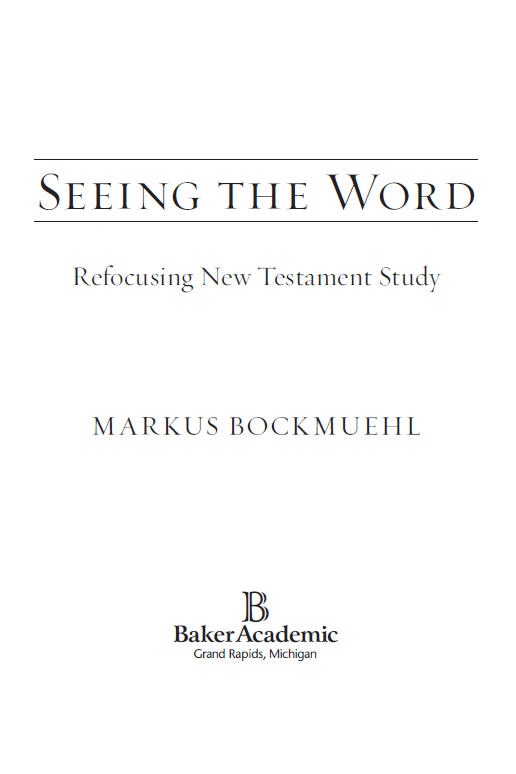
2006 by Markus Bockmuehl
Published by Baker Academic
a division of Baker Publishing Group
P.O. Box 6287, Grand Rapids, MI 49516-6287
www.bakeracademic.com
Ebook edition created 2013
All rights reserved. No part of this publication may be reproduced, stored in a retrieval system, or transmitted in any form or by any meansfor example, electronic, photocopy, recordingwithout the prior written permission of the publisher. The only exception is brief quotations in printed reviews.
ISBN 978-1-4412-0690-9
Library of Congress Cataloging-in-Publication Data is on file at the Library of Congress, Washington, DC.
Unless otherwise indicated, Scripture quotations are from the New Revised Standard Version of the Bible, copyright 1989, Division of Christian Education of the National Council of the Churches of Christ in the United States of America. Used by permission. All rights reserved.
In this important work, Bockmuehl deploys his wide knowledge both of the world of the early church and of the history of modern New Testament scholarship. His diagnosis of the contemporary state of New Testament studies is acute, and his recommendations for future directions are suggestive and important.
Richard Bauckham , professor of New Testament studies,
University of St. Andrews
Markus Bockmuehls Seeing the Word offers fresh possibilities for reading biblical texts in their historic role as the churchs Scripture. There is something to be learned on every page of this study, but the book is especially persuasive in arguing the case for an integrated reading of Scripture that overcomes the specious dichotomy between historical and theological issues and in demonstrating that theological exegesis can draw from and contribute to both the church and the academy. Whether ones interests lie primarily with historical questions or with theological ones, readers will find no guide more capable and learned.
Marianne Meye Thompson , professor of New Testament
interpretation, Fuller Theological Seminary
Witty, sure-footed, and erudite, Markus Bockmuehls Seeing the Word is a gift to all who care about the future of New Testament studies. Though severe in his diagnosis of the fields present crisis, Bockmuehl is heartening and enlightening in his account of how scholars today can reconstitute the study of the New Testament in an intellectually coherent and theologically fruitful way, without sacrificing the genuine gains of recent decades. By highlighting the integrative potential of New Testament study from the perspective of its implied readers and Wirkungsgeschichte , Bockmuehl models an approach whose historical interest is broad enough to encompass the New Testaments historic identity as Christian Scripture and whose theological concern is confident enough to dare public conversation about truth.
R. Kendall Soulen , professor of systematic theology,
Wesley Theological Seminary
C ONTENTS
S ERIES P REFACE
A s a discipline, formal biblical studies is in a period of reassessment and upheaval. Concern with historical origins and the development of the biblical materials has in many places been replaced by an emphasis on the reader and the meanings supplied by present contexts and communities.
The Studies in Theological Interpretation series will seek to appreciate the constructive theological contribution made by Scripture when it is read in its canonical richness. Of necessity, this includes historical evaluation while remaining open to renewed inquiry into what is meant by history and historical study in relation to Christian Scripture. This also means that the history of the reception of biblical textsa discipline frequently neglected or rejected altogetherwill receive fresh attention and respect. In sum, the series is dedicated to the pursuit of constructive theological interpretation of the churchs inheritance of prophets and apostles in a manner that is open to reconnection with the long history of theological reading in the church. The primary emphasis is on the constructive theological contribution of the biblical texts themselves.
New commentary series have sprung up to address these and similar concerns. It is important to complement this development with brief, focused, and closely argued studies that evaluate the hermeneutical, historical, and theological dimensions of scriptural reading and interpretation for our times. In the light of shifting and often divergent methodologies, the series will encourage studies in theological interpretation that model clear and consistent methods in the pursuit of theologically engaging readings.
An earlier day saw the publication of a series of short monographs and compact treatments in the area of biblical theology that went by the name Studies in Biblical Theology. The length and focus of the contributions were salutary features and worthy of emulation. Today, however, we find no consensus regarding the nature of biblical theology, and this is a good reason to explore anew what competent theological reflection on Christian Scripture might look like in our day. To this end, the present series, Studies in Theological Interpretation, is dedicated.
A CKNOWLEDGMENTS
T he argument of this book has occupied my thinking for more than a decade, and it remains very much a work in progress. Nevertheless, I wish briefly to record my thanks to some of the many friends and institutions who have helped me along the way. Much of this book has repeatedly been road tested in lectures, in conference or seminar papers, and in informal talks to students and church groups. I am most grateful to these audiences for their patience with my half-formed thoughts and for their stimulating feedback. These settings have included seminars or symposia at Cambridge; the universities of Aberdeen, Berne, Durham, Oxford, and St. Andrews; as well as Fuller Theological Seminary, College Church in Wheaton, and the Center of Theological Inquiry at Princeton. Other valuable settings included the lunchtime theological discussion group at Little St. Marys Church, Cambridge. I want to record my indebtedness and affectionate thanks to the Grantchester Meadows Group of Ph.D. students meeting fortnightly at my house in Cambridge, who in the Easter and Michaelmas terms of 2004 volunteered to forgo our regular program in order to offer feedback on draft chapters of this book. Members of the group at that time included Charles Anderson, Wayne Coppins, Justin Hardin, David Rudolph, Joel Willitts, Todd Wilson, Stephen Witmer, and John Yates.
Of equal importance have been the many individuals who have assisted in various ways or from whom I have learned in personal conversation and correspondence. Some may have offered a full critique and others a single incisive suggestion; some were more and others less sympathetic to my views; but all were unfailingly patient and constructive in encouraging me with their praise or criticism. Although there are many others, at least the following may be singled out here: Susanna Avery-Quash, Richard Beaton, Michael Cain, James Carleton Paget, Sarah Coakley, Brian Daley, Mark Elliott, Christopher Evans, Richard Hays, Jane Heath, Martin Hengel, William Horbury, Winrich Lhr, Robert Morgan, Werner Neuer, Aidan Nichols, Gordon Plumb, Kavin Rowe, Michael Scott-Joynes, Kendall Soulen, Graham Stanton, Peter Stuhlmacher, John Sweet, Marianne Meye Thompson, Peter Tomson, Benedict Viviano, Francis Watson, and Rowan Williams.
Next page

